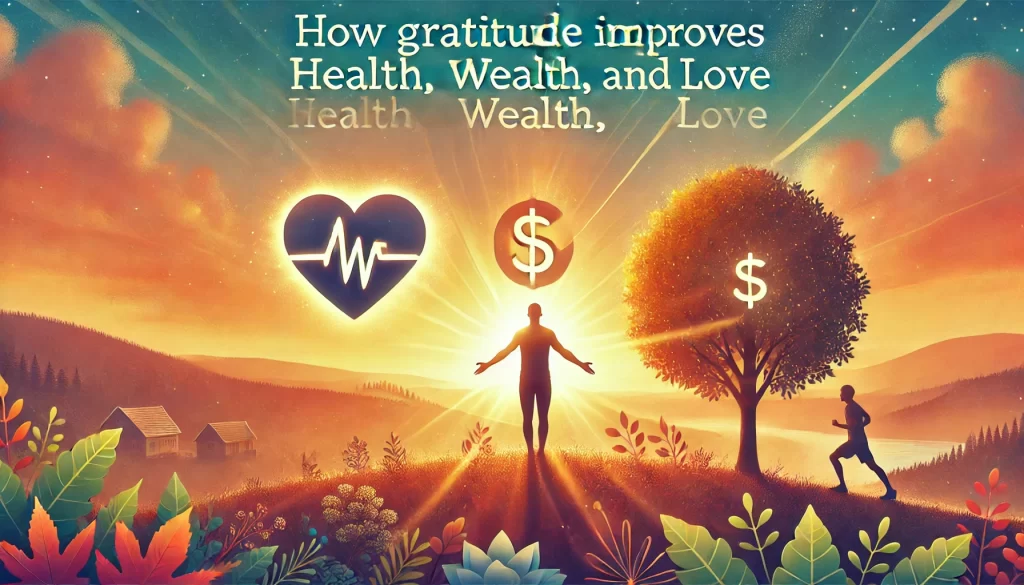“How Gratitude Transforms Your Life: Unlocking Health, Wealth, and Love”
“Harness the Science of Gratitude to Elevate Your Well-Being, Prosperity, and Relationships”
Introduction
Gratitude has long been celebrated as a cornerstone of personal and social well-being, but modern science has now validated its transformative power. By cultivating gratitude, you can enhance your health, attract wealth, and nurture fulfilling relationships. Neuroscience, psychology, and studies in human behavior reveal profound insights into why gratitude is essential and how it reshapes your brain, emotions, and environment. As Cicero once said, “Gratitude is not only the greatest of virtues but the parent of all others.” Let’s dive into the science-backed ways gratitude can change your life.
The Neuroscience of Gratitude: Rewiring Your Brain
Gratitude doesn’t just feel good—it changes the structure of your brain. Neuroscientific studies using fMRI scans reveal that expressing gratitude activates the brain’s reward system, including the prefrontal cortex and the ventral tegmental area, areas associated with pleasure, decision-making, and emotional regulation.
Dopamine and Serotonin Boost
Gratitude triggers the release of dopamine and serotonin, the “feel-good” neurotransmitters. A 2016 study in Frontiers in Psychology demonstrated that regular gratitude practice can significantly elevate mood, reduce symptoms of depression, and improve overall mental health.
Example:
Think about a time you received an unexpected act of kindness. That warm, joyful feeling was your brain releasing a surge of dopamine, reinforcing a positive emotional state.
Health Benefits of Gratitude: A Natural Medicine
Gratitude not only heals the mind but also the body. Research shows that people who practice gratitude experience fewer health issues, sleep better, and have stronger immune systems.
Improved Sleep and Reduced Stress
In a study published in the Journal of Psychosomatic Research, participants who wrote in a gratitude journal before bed fell asleep faster and enjoyed better quality sleep. This is because gratitude lowers cortisol, the stress hormone, creating a sense of calm.
Tip for Practice:
Before going to sleep, write down three things you are grateful for. This simple exercise can shift your focus from stress to serenity.
Enhanced Heart Health
Gratitude has been linked to lower blood pressure and reduced risk of heart disease. According to the American Heart Association, gratitude can decrease inflammation and improve heart rate variability, essential for cardiovascular health.
Gratitude and Wealth: The Law of Attraction in Action
Gratitude is a critical component of the Law of Attraction, which suggests that your thoughts and emotions shape your reality. When you focus on abundance rather than scarcity, you align yourself with opportunities for financial growth.
Abundance Mindset
Gratitude shifts your perspective from “I don’t have enough” to “I already have so much,” fostering an abundance mindset. This perspective cultivates confidence, clarity, and creativity, essential traits for success.
Research Insight:
A study by Dr. Robert Emmons, a leading researcher on gratitude, found that grateful individuals are more likely to achieve their financial goals because they make thoughtful decisions rather than reactive ones driven by fear or anxiety.
Practical NLP Technique:
Anchor gratitude by visualizing a moment of financial success, such as receiving a promotion or closing a deal. Combine this visualization with a physical anchor, like pressing your thumb and forefinger together, to reinforce the emotional state of abundance.
Gratitude in Relationships: Building Bridges
Gratitude strengthens bonds and deepens emotional connections. Dr. John Gottman, a renowned relationship expert, highlights that showing appreciation in relationships fosters trust and intimacy.
The Reciprocity Principle
When you express gratitude to your partner, friend, or colleague, they are more likely to reciprocate with positive actions. This creates a virtuous cycle of goodwill and affection.
Example:
Imagine thanking your partner for something as simple as making coffee. Their mood brightens, and they are more inclined to do something kind for you, enhancing the relationship’s overall quality.
Resolving Conflicts with Gratitude
In heated moments, shifting your focus to what you appreciate about the other person can diffuse tension. This is supported by studies in human behavior, which reveal that gratitude reduces defensiveness and promotes empathy.
How to Cultivate Gratitude Daily
Gratitude isn’t just an occasional emotion; it’s a habit. Here’s how to integrate it into your life:
- Gratitude Journaling
Dedicate five minutes daily to list three things you’re grateful for. Over time, this practice rewires your brain to focus on positivity. - Express Appreciation
Make it a habit to thank at least one person daily. Whether it’s a heartfelt text or a verbal acknowledgment, your expression of gratitude strengthens relationships. - Visualization
Spend a few minutes visualizing a past experience or future moment that fills you with gratitude. This practice enhances emotional resilience and optimism. - Gratitude Meditation
Focus on your breath while mentally listing what you’re thankful for. This combines mindfulness with gratitude, amplifying its effects.
Real-Life Example: Gratitude in Action
Consider Sarah, a corporate professional struggling with stress and strained relationships. She started a daily gratitude practice, journaling every night and expressing appreciation to her colleagues. Within weeks, Sarah noticed improved teamwork at work, a calmer mind, and even unexpected financial rewards like bonuses. Gratitude became her superpower for success.
Conclusion: Gratitude as a Superpower
Gratitude is more than a feel-good practice; it’s a scientifically proven strategy to improve health, attract wealth, and deepen love. By rewiring your brain, reducing stress, fostering an abundance mindset, and strengthening relationships, gratitude unlocks the best version of yourself. As Maya Angelou said, “This is a wonderful day. I’ve never seen this one before.” Let every day be a celebration of gratitude, and watch your life transform.
Call to Action
Begin your gratitude journey today. Start small, stay consistent, and observe the ripple effects on your health, wealth, and relationships. Share your experiences with gratitude in the comments below—we’d love to hear your story!
Gratitude and health, benefits of gratitude, gratitude neuroscience, improve relationships with gratitude, gratitude for wealth, gratitude psychology, gratitude NLP techniques, human behavior and gratitude.
Join My 90 Minutes Webinar, “Mindset Mastery Blueprint.” Register Now!

